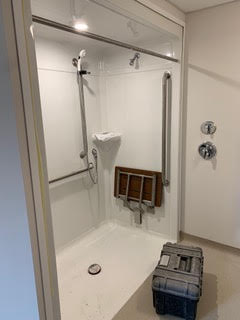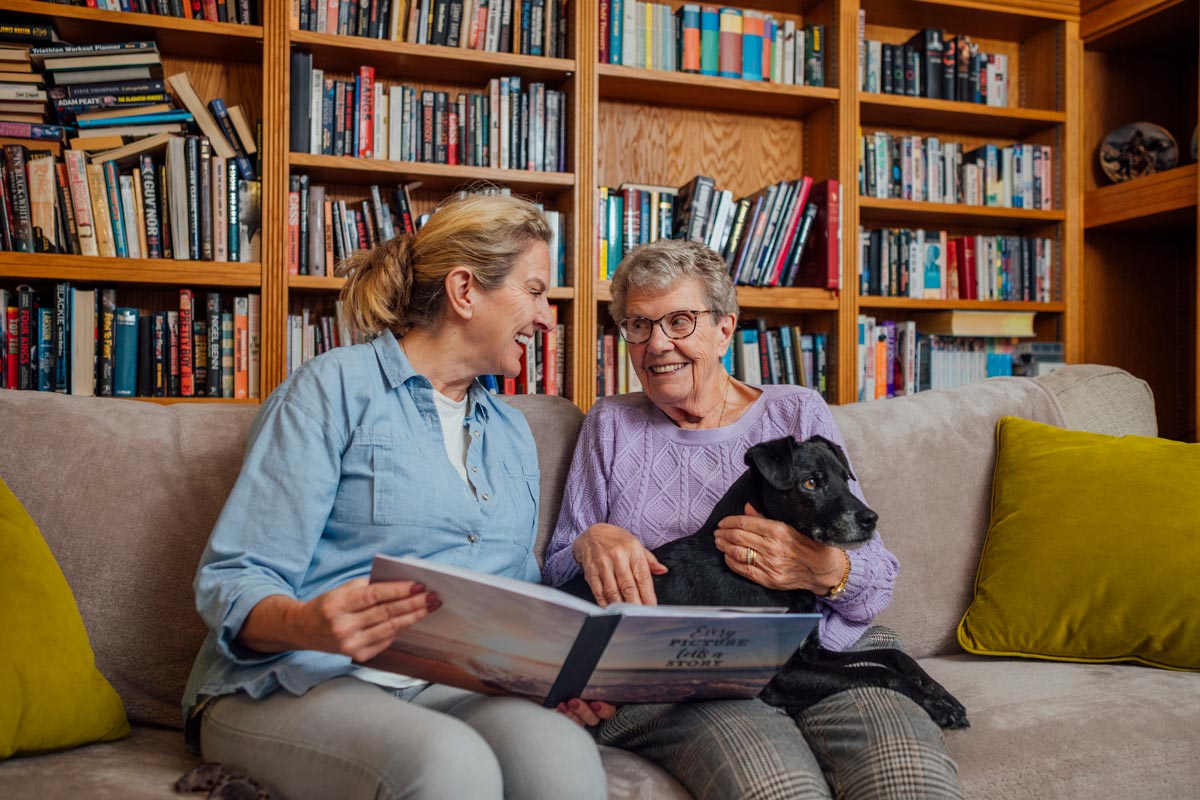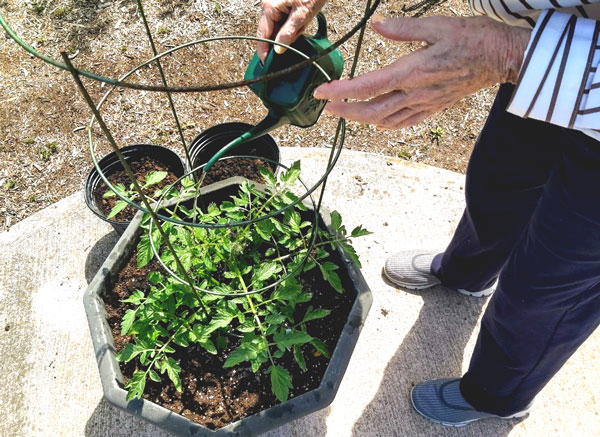Someone you know has dementia. Maybe it’s a friend or family member. It’s been a while since you’ve seen them. You’re not sure that it’s a good idea for you to visit. Are they really still the person you knew? Wouldn’t it just be awkward?
It’s easy to let this kind of uncertainty keep you away. It’s hardly surprising then that social isolation can be a big problem for people living with dementia.
So, how can you get past your doubts and stick by your friend or relative when they need you most?
With the assistance of Kait Carnegie, Activation Coordinator at our homes in Kitchener, we’ve put together 7 tips to help you prepare for a visit and make it as enjoyable and meaningful as possible.
1. Consider visiting early in the day
Many people with dementia are at their best from mid-morning to early or mid-afternoon. After that, they may be prone to restlessness and confusion, a phenomenon known as sundowning. Not everyone follows the same pattern, though. Check with the person’s family to see when it might be best for you to visit. Keep in mind that most individuals with dementia tend to get tired later in the day, so dropping in for supper may not be the best option.
2. Let go of the urge to correct
The first thing to realize is that you may not be able to have the same kind of conversations with the person as you did in the past. If they forget something you just told them, avoid correcting them or saying things like, “We talked about that just a few minutes ago. Don’t you remember?” Chances are they genuinely don’t.
A better response is to acknowledge what they’ve said and then casually change the topic. Let go of the desire to correct them. It’s not going to help them, and it’s likely only going to frustrate you. The sooner you recognize that expecting them to behave “normally” is an unproductive exercise, the more likely you’ll have a successful visit.
3. Realize that fibbing is okay
In the same vein, there are times when it’s perfectly okay not to tell the truth, particularly if the truth is upsetting. It’s best to say things that comfort rather than distress the person, even if it means telling little white lies.
For instance, if the person you’re visiting asks after someone they love, and you know their loved one died a year ago, reminding them of the death will only make them relive their grief. Instead, come up with a positive, plausible cover story that comforts them.
Kait offers an example. She remembers a resident who kept asking when his deceased wife was “coming home.” She responded by telling him things like “Oh, she went for physio” because that was something his wife used to do. Or “Oh, she went out for lunch with the girls. You know that they like to talk a lot, so we don’t know when she’ll be home.”
He might ask the same question several times a day. Telling him the truth would simply have made him re-experience the loss of his wife anew each time he asked the question.
4. Use objects and activities
If just sitting and talking is difficult, spend time doing an activity together when you visit. Dementia care homes have a variety of activity supplies on hand that you may be able to borrow. Among the many things that Highview keeps on hand are short stories and binders of trivia. Both can be used to encourage conversation and reminiscing. For instance, a piece of trivia or part of a story might prompt you to say something like, “Hey, I remember when you used to bake me an apple pie. That was my favourite thing about Thanksgiving.”
Photo albums are another great conversation starter. Maybe the person you’re visiting has an album with lots of vacation pictures. You can say things like, “Oh, you went on a cruise. Did you ever get seasick? What was your favourite part? Did you like the water? the sand?” Some families will even label photos with people’s names and ages.
Kait says, “Just because the person you’re visiting may not be able to tell you things in chronological order, that doesn’t mean you can’t talk about the memories that you share with them.”
If you still don’t know what to do during a visit, then drop in and have a meal with the person. Many dementia care homes have pay-as-you-go options for visitors. Sit at their regular table. Socialize with the people they’re socializing with. Use the meal as a topic of conversation.
5. Don’t be afraid to bring children with you
If you have children, you might be hesitant to bring them along for a visit. But according to Kait, they’re actually the easiest topic of conversation. Anyone who’s been a parent, even if they have dementia, will likely remember what it’s like to care for children. Their parenting instincts tend to click in.
They can do activities with the kids like colouring or crafts. They can have tea and cookies with them. Or they can just watch them play. It makes the visit easier. And if it’s their grandkids or other relatives, it brings the family together.
6. Offer practical help to the family caregiver
If you’re visiting someone in their own home, it’s a chance to show support for their primary caregiver, be that their spouse or an adult child. Often, practical offers of support are the most readily received. Offer to pick up some groceries. Or make a meal. It’s one less thing the caregiver will have to do themselves.
You can also offer to give them some time to themselves. As you visit, the caregiver might use the time to have a rest or catch up on laundry. Consider taking the person with dementia out for a country drive, Kait suggests. “Take them to Tim Hortons and get a coffee. If it’s nice out, you could take them out to the park for a walk.” If they rely on their primary caregiver for constant support, bring the caregiver along. At least it will help both of them get out of the house.
7. Don’t give up
If your visit doesn’t go well, don’t be discouraged. Just because the person gets agitated or restless or doesn’t seem happy to see you, don’t take it as a sign that you shouldn’t visit again. It might simply have been a bad day for them. Things may be better the next time you see them. Try again.
Do you have other questions about supporting someone with dementia? Get in touch with us. We’d be happy to help.








